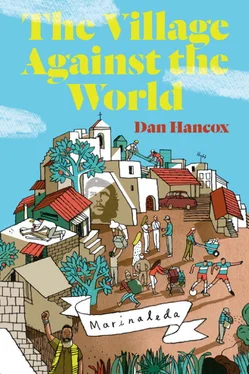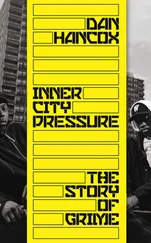These ruins of late capitalism scar the Spanish landscape. Spain has long had a grimly fascinating number of ghost towns: from the Civil War, when villagers fled for their lives, never to return, and from the 1950s and 1960s, when people escaped rural poverty in search of work. While Marinaleda’s population declined by 30 per cent during the 1960s for this reason, some small hamlets were abandoned altogether, and never repopulated.
The trend for dramatic, mesmerising photographs of Detroit’s burned-out factories and abandoned homes has coined the term ‘ruin porn’. The Spanish equivalent is speculation porn, exemplified by photo-spreads in the newspapers of entire new Madrid suburbs built on the assumption of relentless growth and completed just before the crash. These modern ghost towns are haunted by a different mortal terror to Detroit’s: not the decay of previously thriving communities, but the folly of baseless expansion, of urban spaces that have never been used and may never be used. An architect’s impression, a blueprint of blind optimism, sketched out in three dimensions and now abandoned: rust sleeping on the gates, tumbleweed in the gardens, lamps illuminating empty streets, brand new street signs pointing nowhere. Permanent vacancy.
Over the last few years la crisis in Spain – that distant land, beyond the borders of the village – has become a permanent state of affairs; it is a phrase you hear so often in news reports and everyday conversations, it almost loses meaning. La crisis is not a moment, not even an unpleasantly long-lasting event, but the state of things.
In May and June 2011, as the PSOE government stuttered towards its inevitable collapse, and unemployment, foreclosures and debt soared to astounding new highs, the Spanish people mounted their first serious response to the crisis. The now famous indignados movement began in Madrid with the occupation of the capital’s iconic central square, the Puerta del Sol, on 15 May 2011, and over the following weeks spread out into all of Spain’s major towns and cities, until it was a truly national phenomenon, identified by the name 15-M or ‘the Spanish revolution’. The broadest phrasing of the many demands emanating from the 15-M encampments was for ‘real democracy now’. Its pluralistic anti-capitalism, horizontalism, pacifism, general assemblies and working groups became both the template and the immediate inspiration for the global Occupy movement, in America and beyond. A study for Ipsos Public Affairs that summer found between 6 and 8.5 million people, in a country of only 48 million, said they had taken part: 76 per cent of those polled said their demands were reasonable, and only 7 per cent were opposed to the protests.
‘We are’, announced one especially totemic 15-M slogan, ‘neither right nor left: we are coming from the bottom and we’re going for the top.’
Seville may be a city of historic renown, a major international tourist destination, and the capital of Andalusia, but it’s not actually very big: it’s less than a quarter of the size of Madrid. Nonetheless, the day protests exploded into life there, 29 May 2011, over 30,000 people spilled out of the Metro and into the Plaza de España. The Plaza was the central exhibit in the 1929 Sevilla Expo, a massive monument from a world fair built on the brink of global collapse, a space so wide and open it makes you catch your breath – with only the central fountain to draw your eye away from the sumptuous tiles of the perimeter; it hosts the best kind of emptiness, a vacancy that demands to be filled with people. And then, drums playing, in the glorious heat of early summer, they marched past the world’s largest cathedral, past the Moorish Giralda tower, past Plaza Nueva, where the city hall is, and eventually halted on the newly finished public-private architectural monstrosity widely known as The Mushroom. The camp lasted a month there, with thousands sleeping over for some or all of the period, yearning for the full experience, the corporeal solidarity.
Amid Seville’s wizened stone and garlanded history, the demand was for something new. If they were to start creating ‘real democracy now’, as their slogan demanded, it would be focused on horizontal organisation, mass assemblies, and consensus-based decision making. A resurgent sincerity seemed to emerge from the swamp of postmodernist irony, just as it did in New York. In both cases, they meant business. ‘They wanted to take it seriously,’ Emma the indignada told me, when I met her later that year. ‘Drinking was forbidden, because it was not supposed to just become a party, so at one or two in the morning people were just chatting quietly about politics, or sleeping. A lot of different topics came up, with people who wanted to help Palestine or the Sahara. You had a schedule, day by day, a lot of events and discussions. People were bringing food from home to The Mushroom – there were people from nearby villages and towns outside Seville, including Marinaleda.’
Emma was not an experienced activist, and she seemed particularly eager that I understand her consternation at just how broad and unprecedented a movement it was: 15-M was something unique and special, the source of an empowering head-rush of new possibilities. This, she explained, was a new level of participation, involving more than just the usual suspects such as the leftist parties, anarchists, perroflautas (hippies) and socialist trade unions.
‘Of course,’ Emma continued, ‘there was a big representation from Marinaleda at 15-M, they hired a big bus so everybody could come to Seville. Marinaleda is really, really important for us.’ Why is that, I asked? ‘Because here we are really too quiet, and they are not. I’m so excited you’re going there,’ she said, kindly, like I was in for a treat.
‘Before I went to Marinaleda, I had this idea of it being a very revolutionary place, and it is, but … it’s really the old people who are like that. The young people you see there don’t seem to be conscious of how lucky they are, of all the things they have. It’s really weird. They live in a kind of bubble, they don’t realise what the world is like elsewhere.’
So they don’t ever leave the bubble?
‘Well, I’ve never met anyone from Marinaleda who is not actually living there. You’re not going to find a really intellectual place there – don’t misunderstand me, it’s people who’ve been working all their lives, but before, they were working for big landowners.’
For centuries, there has been anger across the south of Spain about the latifundios . ‘But in Marinaleda,’ she said emphatically, ‘– in Marinaleda they didn’t get angry, they just went! They broke down the gate, got inside, knocked on the door and said “We need land”.’ Her admiration for the marinaleños as people who act out their class war, rather than merely talking about it, as pseudo-intellectual city folk are wont to do, was not in the least patronising – there was genuine longing in her voice, for that level of political integrity. The dedication to direct action certainly tallies with the history of the Andalusian pueblos . Sánchez Gordillo would later cite to me the notion of ‘propaganda of the deed’ as anarchism’s greatest influence on his politics.
The 15-M participants not only protested against the dire state the crisis had left them in, they also announced their complete lack of faith in the established parliamentary parties – in parliamentary politics at all – to solve any of these problems. It was thus inevitable when, in November 2011’s general election, plagued by incompetence and incumbency, the nominally centre-left PSOE were ousted in favour of the rightist PP. The left-wing coalition IU, which Sánchez Gordillo’s CUT party belongs to, doubled their previous vote share to 7 per cent nationally, but to expect the indignados ’ energy and numbers to be transformed into any kind of game-changing protest vote is to misunderstand the nature of their indignation.
Читать дальше












